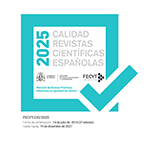Reformulation Markers in Non-initial Position in Written English and Spanish
Abstract
This article presents a contrastive analysis of non-initial positions (less common and, therefore, marked) of explanatory reformulation markers in written language in English and Spanish, in relation to their discursive uses. To carry out this analysis, the cases of these markers found in a comparable English-Spanish corpus (Cobuild and CREA) are analyzed. Four positions are established, initial, intermediate, final and independent (Pons 2014), and the results of the non-initial positions are related to the different discursive uses of these markers (Murillo 2012, 2016a, 2016b), taking into account their reformulative and modal uses. The results reveal that the markers in English —particularly that is, but also in other words— display more mobility than those in Spanish —the only one having some mobility is o sea. In addition, regarding their discursive uses, the analysis of the corpus reveals that the markers follow different trends in the two languages.
Downloads
Article download
License
In order to support the global exchange of knowledge, the journal Complutense Journal of English Studies is allowing unrestricted access to its content as from its publication in this electronic edition, and as such it is an open-access journal. The originals published in this journal are the property of the Complutense University of Madrid and any reproduction thereof in full or in part must cite the source. All content is distributed under a Creative Commons Attribution 4.0 use and distribution licence (CC BY 4.0). This circumstance must be expressly stated in these terms where necessary. You can view the summary and the complete legal text of the licence.









